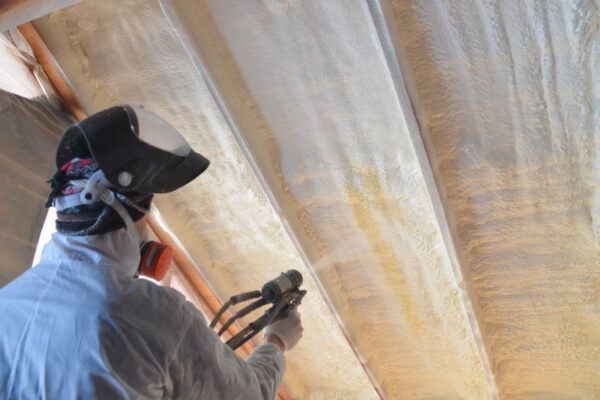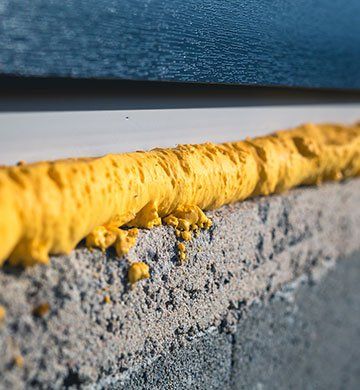Spray Foam: The Ultimate Remedy for Air Sealing and Insulation
Spray foam insulation has actually arised as a leading service for efficient air securing and thermal insulation, providing a special mix of residential properties that establish it apart from standard techniques. Understanding the complete extent of its advantages, setup processes, and contrasts with various other insulation types is important for making educated decisions.
What Is Spray Foam?
Spray foam is a versatile insulation material that combines the concepts of air sealing and thermal resistance to enhance power efficiency in structures. Made up primarily of polyurethane or various other similar substances, spray foam is used as a liquid that increases upon contact with surface areas, producing a strong, constant layer of insulation. This unique property enables it to fill voids, fractures, and voids that standard insulation materials might neglect, giving a remarkable air seal.
There are two primary kinds of spray foam: open-cell and closed-cell. Open-cell spray foam is lighter and a lot more flexible, supplying outstanding audio absorption and a lower R-value per inch - Spray Foam. In comparison, closed-cell spray foam is denser, providing a greater R-value, moisture resistance, and added architectural integrity to developing parts
The application process commonly includes customized equipment, making sure a smooth application that sticks to different substratums, including wood, concrete, and metal. This flexibility makes spray foam appropriate for both new building and constructions and retrofitting existing structures. Its capability to create an impermeable obstacle dramatically contributes to decreasing power consumption and enhancing indoor air high quality, therefore making it a preferred option amongst contractors and house owners alike.
Benefits of Spray Foam Insulation
Among one of the most substantial advantages of spray foam insulation is its remarkable capacity to create a continuous air barrier, which successfully decreases power loss. Unlike conventional insulation materials, spray foam broadens to load voids and splits, making certain that air leak is drastically reduced. This characteristic not only enhances power performance but likewise results in decrease utility expenses in time.
Furthermore, spray foam insulation gives superior thermal resistance, adding to a much more secure interior setting. Its high R-value per inch permits effective insulation in restricted rooms, making it optimal for attics, wall surfaces, and crawl spaces. The moisture-resistant homes of spray foam aid stop mold and mildew and mold development, promoting much healthier living conditions.
Another crucial advantage of spray foam insulation is its sound-dampening qualities (Spray Foam). It efficiently minimizes sound transmission in between spaces, creating a quieter and much more comfortable home environment. The toughness of spray foam also stands out, as it does not droop or clear up in time, preserving its performance throughout its lifespan
How Spray Foam Functions
Recognizing how spray foam insulation works is necessary for appreciating its effectiveness in air sealing and thermal resistance. Spray foam insulation contains 2 primary parts: isocyanate and polyol material. When these components are blended, they undertake a chain reaction that creates the material to broaden swiftly, creating a thick foam that loads spaces, splits, and tooth cavities.
As the foam increases, it complies with surface areas, developing an impermeable seal that dramatically decreases air seepage. This characteristic makes spray foam insulation extremely reliable at protecting against drafts and moisture penetration, which can result in power loss and damage in time. In addition, the closed-cell variation of spray foam offers superior thermal resistance as a result of its stiff framework, effectively reducing warm transfer.
The distinct residential or commercial properties of spray foam allow it to adapt uneven surfaces, guaranteeing thorough protection and a smooth obstacle. Consequently, spray foam insulation not just improves energy performance however likewise adds to boosted interior air quality by lowering the accumulation of allergens and pollutants. Eventually, understanding the technicians behind spray foam underscores its duty as a remarkable option for insulation and air securing in both business and property applications.
Installation Process Review

Before installment, the space has to be effectively cleaned and prepped, making sure that surface areas are totally free from dirt, debris, and moisture. Since pollutants can endanger attachment and overall efficiency, this step is important. Once the area is prepared, the application includes blending the two elements of the spray foam, which expands upon get in touch with and fills spaces content successfully.
Trained specialists ought to conduct the installment, using specialized devices to make certain consistent insurance coverage and optimal thickness. Safety safety measures, consisting of using safety gear and ensuring correct air flow, are essential throughout this procedure. After application, the foam normally treatments rapidly, creating a solid barrier that enhances power performance.
Contrasting Spray Foam to Standard Insulation
When evaluating insulation alternatives, spray foam insulation stands out in comparison to conventional materials such as fiberglass and cellulose. Unlike fiberglass and cellulose, which can allow air infiltration, spray foam expands upon application, filling holes and spaces to create an impermeable seal.
Furthermore, spray foam offers a higher R-value per inch than standard insulation kinds, supplying more effective thermal resistance in a thinner account. This particular is particularly useful precede with restricted tooth cavity deepness. Spray foam is immune to dampness and mold development, which can be a substantial problem with cellulose and fiberglass, especially in damp atmospheres.
However, spray foam insulation commonly carries a greater in advance price than its conventional counterparts. Property owners need to consider this initial investment versus lasting power financial savings and performance benefits. Inevitably, while both insulation types serve their function, spray foam becomes a more sophisticated solution for modern-day insulation requirements, especially in regards to air sealing and thermal performance.

Final Thought
In summary, spray foam insulation stands for a highly reliable remedy for achieving optimum air securing and thermal resistance. Its distinct residential properties, consisting of dampness resistance and sound dampening, make it ideal for various applications in both brand-new constructions and retrofitting tasks (Spray Foam). Although the first costs might be higher compared to standard insulation products, the long-lasting advantages, such as considerable energy savings and enhanced indoor air top quality, validate the financial investment and underscore its value in modern building methods.
Spray foam insulation has actually arised as a leading solution for effective air securing and thermal insulation, providing an one-of-a-kind combination of properties that set it apart from conventional techniques.Spray foam is a flexible insulation product that incorporates the principles of air sealing and thermal resistance to enhance power Recommended Reading performance in structures.When assessing insulation alternatives, spray foam insulation stands out in contrast to standard materials such as fiberglass and cellulose. Eventually, while both insulation kinds offer their function, spray foam arises as a much more sophisticated option for modern insulation demands, particularly in terms of air securing and thermal performance.
In summary, spray foam insulation represents a very effective remedy for visite site attaining ideal air securing and thermal resistance.